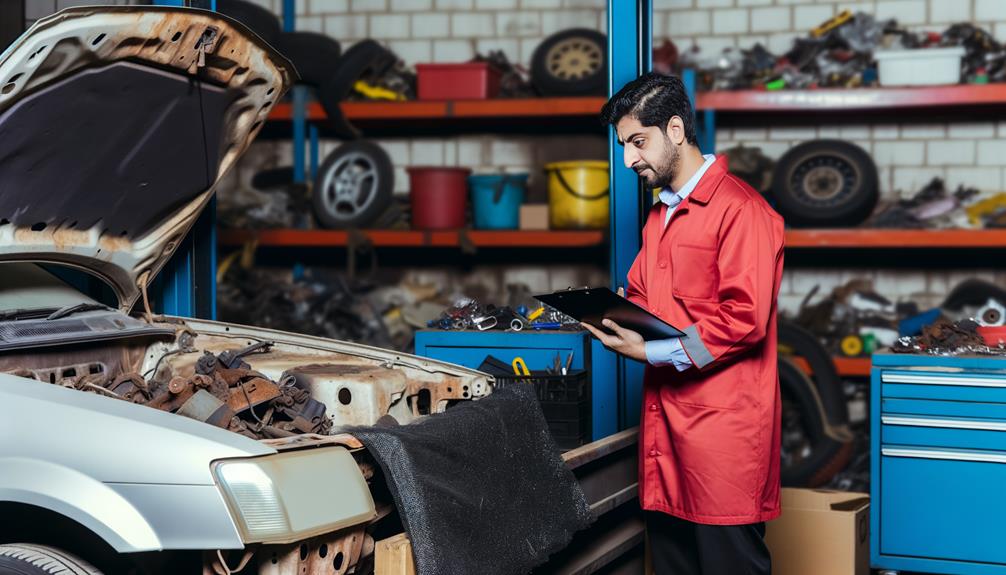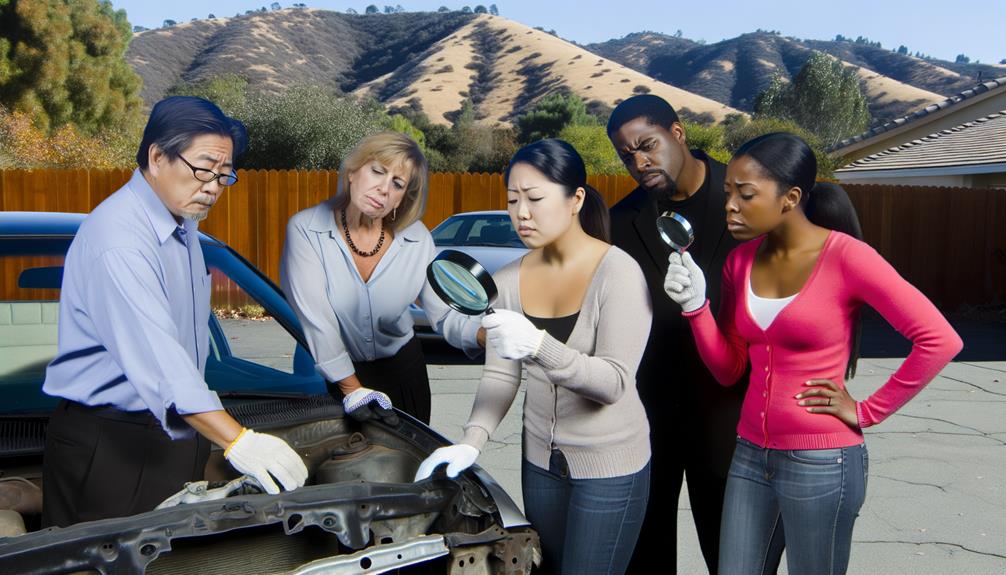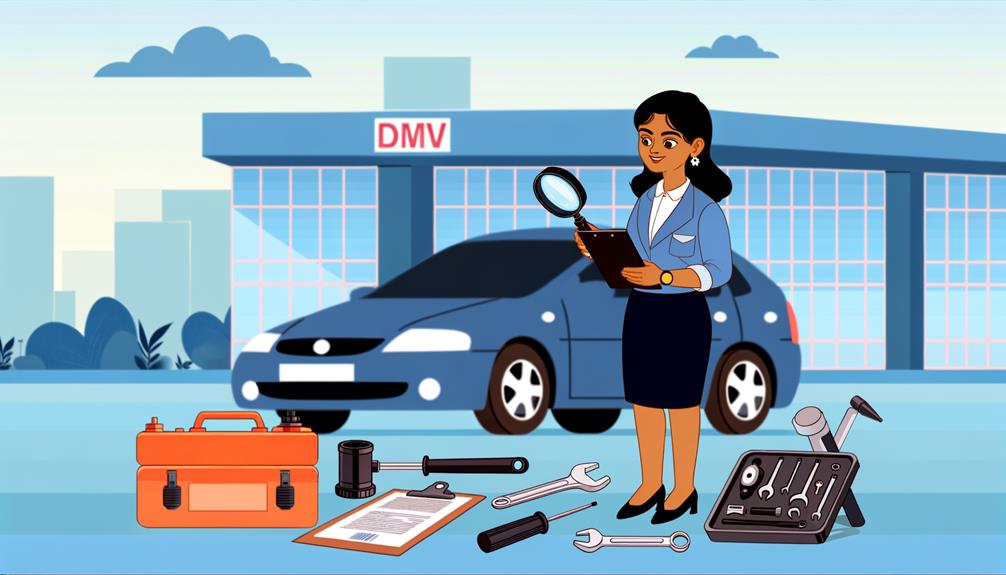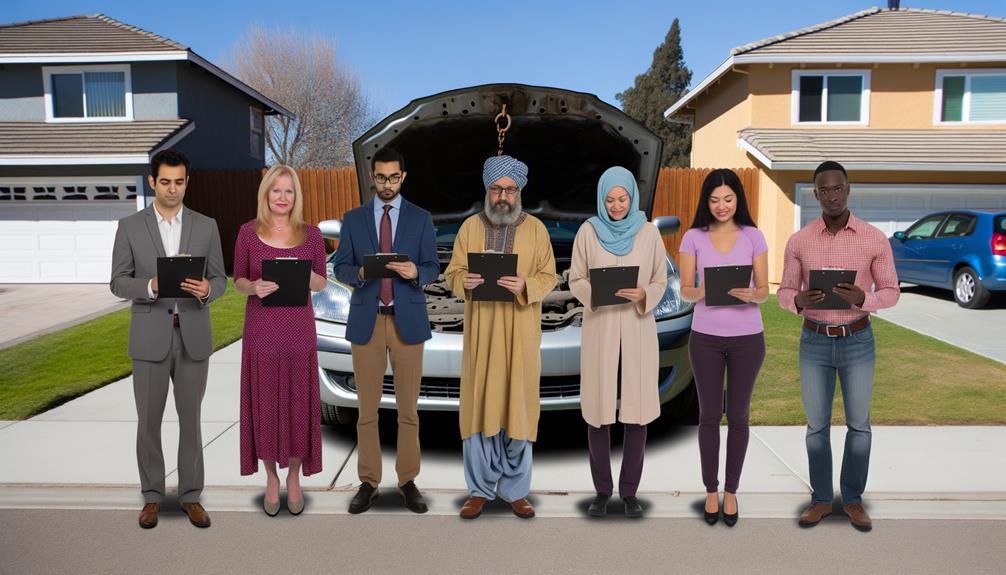As a North Hills resident, you must get a VIN verification for your salvaged vehicle before re-registering it to guarantee it meets California's strict anti-theft and fraud regulations. This mandatory check confirms that your vehicle's VIN matches official title records and helps maintain record accuracy with the DMV. You'll need to present original receipts for any major replaced components and ascertain compliance with safety standards through an authorized DMV employee or a CHP officer's inspection. Numerous options, including mobile services, can make this process convenient for you. By understanding the requirements and services available, you'll ensure your vehicle re-registration is seamless and standardized.
VIN Verification Overview

VIN verification is a mandatory inspection process in California for vehicles coming from out of state. If you're looking to re-register a salvaged vehicle, understanding this procedure is essential for your safety and compliance with regulations.
The California DMV requires this inspection to guarantee the vehicle identification number (VIN) matches title records, affirming the car's legal existence and history.
When dealing with salvaged vehicles, VIN verification becomes even more significant. It's not just a formality; it's a safeguard against theft, fraud, and illegal registrations. This process is meticulously documented on the REG31 form, a vital document that you must keep for your records.
Additionally, authorized VIN verifiers include DMV employees and CHP officers, who confirm that all aspects of the vehicle, such as the odometer and emissions label, are accurately assessed.
Licensed verifiers, authorized by the DMV or California Highway Patrol (CHP), carry out this inspection. They verify your vehicle adheres to state laws, checking the VIN's accuracy and the vehicle's legitimacy.
This step is indispensable in guaranteeing that your salvaged vehicle is fit for the roads and won't pose a risk to you or others.
Inspection Requirements
After understanding the importance of VIN verification for salvaged vehicles, it's important to know the specific requirements for the inspection process. As a North Hills resident, you'll need to prepare for a meticulous California Highway Patrol (CHP) inspection. This step is critical for ensuring your vehicle's identity matches the title and supporting documents.
First off, make sure you've gathered all necessary DMV paperwork and the associated fees. Having everything in order streamlines the process and helps avoid any delays. Remember, compliance with these details isn't just bureaucracy; it's about ensuring safety and legality.
Additionally, considering the VIN verification requirements, it's essential to confirm with a licensed verifier or the CHP that your vehicle's identification number is accurate and correctly listed in all documentation.
During the CHP inspection, the officer will check that the vehicle identification number on major components like the hood, fenders, trunk, and dashboard matches the VIN on your documents. This step is crucial for fraud prevention, confirming that your salvaged vehicle hasn't been tampered with or illegally altered.
Additionally, you must present original receipts for any major components replaced during the repair of your vehicle. These receipts are important for documenting the legitimacy of your repairs and components, further aiding in the re-registration process and ensuring compliance with safety standards.
Verification Options

For residents of North Hills seeking VIN verification for salvaged vehicles, several convenient options are available.
You can start with free services provided by the DMV and CHP, ensuring you bring all necessary documentation to facilitate the process. This is essential to comply with California's stringent registration regulations for salvaged vehicles.
If you're looking for more personalized service, Quick VIN Verification and other licensed private verifiers like Redline Registration Services offer efficient alternatives.
These services are particularly beneficial if you're pressed for time and prefer not to navigate the often lengthy DMV queues. Quick VIN Verification provides mobile services, allowing them to come directly to you, which can be a significant advantage if you're balancing a busy schedule.
Costs and Payments
Understanding the costs associated with VIN verification is essential as you navigate the process of registering your salvaged vehicle. At the core, you've got several options. Quick VIN verification services in California generally cost $35 if you visit their location.
If you opt for convenience and choose mobile services, the price can range from $67 to $147, depending on your specific area. This flexibility helps you manage your safety needs without compromising on your schedule.
If you're an AAA member, you're in luck! You can access VIN verification services for free, which is a significant saving. However, if you're not a member, you'll need to pay for these services through other providers.
Alternatively, the California DMV provides free VIN verification, assuming you've got all your paperwork perfectly lined up. Remember, though, this could mean facing longer wait times.
The California Highway Patrol (CHP) also offers VIN verifications at no cost, but this requires a referral from the DMV and specific documentation.
As for payment methods, you're covered with options including cash, checks, credit or debit cards, and digital payments like Zelle and Venmo, ensuring you can handle the transaction smoothly and securely.
Additional Services Offered

Maneuvering the process of VIN verification for your salvaged vehicle involves more than just the basic check; several companies offer extensive services to ease your journey.
In North Hills, Quick Auto Tags isn't just about VIN verification; they're a hub for all your licensed registration services. They streamline the DMV registration renewal, making sure you don't face any hitches with your salvaged vehicle's paperwork.
Beyond the basics, Redline Registration Services steps in to simplify even more aspects of vehicle documentation. If you're missing a title or need to transfer ownership, they handle these processes efficiently, ensuring you're not stuck in bureaucratic delays.
They also manage planned non-operation status processing, which is vital if you're not planning to use your vehicle immediately but want to stay compliant with DMV regulations.
Moreover, Quick VIN Verification offers tailored inspection services. They understand that scheduling can be a hassle, so they work around your timetable, providing flexibility that makes the whole registration process smoother.
With services like these, you're not just getting your vehicle back on the road; you're ensuring it meets all safety and regulatory standards without any added stress.
Frequently Asked Questions
Can You Register a Salvage Title Vehicle in California?
Yes, you can register a salvage title vehicle in California, but it must pass a VIN verification and safety inspection. You'll need to present repair receipts and apply for a rebuilt title first.
Why Do I Need a VIN Verification in California?
You need VIN verification in California to guarantee your vehicle's identity matches official records, enhancing safety by preventing fraud. It's required for registering salvaged vehicles to confirm their legality and history.
How to Revive a Salvage Title in California?
To revive a salvage title in California, you'll need to pass a VIN verification, submit original repair receipts, complete a brake and lamp inspection, and file all paperwork with the DMV for re-registration.
How to Clean a Salvage Title in California?
To clean a salvage title in California, you'll need to repair your vehicle, gather original receipts, and pass a CHP inspection. Then, submit paperwork and fees to the DMV for a rebuilt title.







